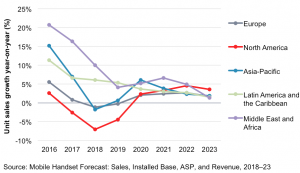
After more than 40 years of operation, DTVE is closing its doors and our website will no longer be updated daily. Thank you for all of your support.
Ovum: 5G and foldable displays will not change smartphones’ fate
 Multiple reports of failures of 5G and foldable displays have tainted the prospect of a smartphone market rebound in 2019.
Multiple reports of failures of 5G and foldable displays have tainted the prospect of a smartphone market rebound in 2019.
Smartphone market saturation has been a long time coming, and manufacturers and operators have already tried multiple times to reinvigorate the market. Despite bundling consumer Internet of Things (IoT) devices with flagship launches (e.g., mobile virtual reality [VR], wearables, and even mini 3D printers) and offering premium smartphone leasing contracts, such as iPhone Upgrade, it seems that longer replacement rates are unstoppable.
2019 brought new hope with the launch of 5G networks and foldable displays, and April and May will make history with the first commercial launches. A supply-side view will make you believe that these will spark the largest replacement cycle the smartphone market has ever seen, but this couldn’t be further from the truth.
The bigger the technology leap, the more problems it will encounter. First, LG announced that it was delaying the launch of its 5G smartphone in Korea, as it needed more time to fine-tune the design. Then, reports of Intel’s inability to meet Apple’s demand for 5G modems were followed by the settlement of multiple court cases between Apple and Qualcomm, and Intel subsequently dropping its entire 5G
modem business. Finally, with Samsung’s highly anticipated first foldable smartphone, the Galaxy Fold, there have been multiple reports of display failures on the first test devices distributed to influencers and tech journalists, causing the delay of its release date.
Competitive pressure pushes companies like Samsung and LG to take more risks, and it is questionable whether this “first-to-market” approach necessarily pays off. The complexity of today’s technology is such that breakthroughs led by a single company are extremely rare. Competition also responds much faster than it used to, meaning that the benefits of a pole position quickly fade. Company shareholders demand a solution to smartphone market stagnation, but pushing product launches despite technology glitches will always be detrimental to the company and the overall industry.
Technology failures of foldable displays and 5G are to be expected, but high-profile failures can dampen or even eradicate any consumer enthusiasm for the new technology, as seen with augmented reality (AR) headsets, which have yet to recover from the Google Glass failure. Ovum does not expect 5G and foldable displays to change the trajectory of the smartphone market for several years, even if they are in perfect working condition. We do, however, forecast the smartphone market to come back to steady single-digit growth from 2020 onward.
Ronan de Renesse is practice leader, consumer technology and media & entertainment at Ovum.
Straight Talk is a weekly briefing from the desk of the Chief Research Officer. To receive this newsletter by email, please contact us.


